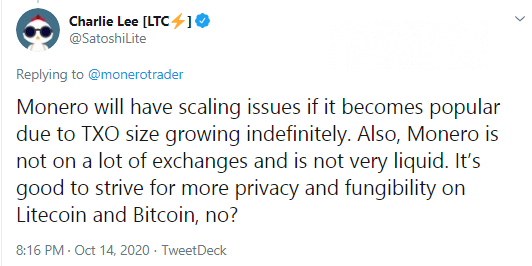When it comes to privacy, Monero (XMR) is usually referred to as the undisputed leader. However, the Litecoin founder explained why it isn’t suitable for payments yet
Cover image via en.wikipedia.org
In a semi-ironic manner, legendary lead of Monero (XMR), Riccardo “Fluffy Pony” Spagni claimed that his discussion with Charlie Lee of the Litecoin Foundation can only be settled in “a knife fight at noon.”
Is Monero (XMR) vulnerable to scaling issues?
An anonymous Monero (XMR) proponent who goes by @monerotrader on Twitter recommended that Litecoin’s creator, Charlie Lee, use Monero (XMR). This is how he responded to Lee’s interview with Coindesk about the advantages of user privacy. However, Mr. Lee was not so enthusiastic about that idea.

He is sure that the Monero (XMR) protocol will be plagued by scalability issues once its adoption expands. The shortage of liquidity due to the limited number of exchange listings is one more demerit of Monero (XMR) as a payment instrument.
As covered by CryptoComes previously, centralized exchanges still continue delisting privacy-oriented coins due to increased regulatory scrutiny. In August, leading Australian platform Coinspot shared plans to delete Monero (XMR), ZCash (ZEC) and Bytecoin (BCN) from its trading spot.
Monero (XMR), ZCash (ZEC), Bytecoin (BCN) to Be Delisted From Australian Exchanges: Analyzing Reasons Behind Delisting

Reconsidering the privacy and fungibility of Bitcoin (BTC) and Litecoin (LTC) would be the much more natural direction of blockchain’s progress, Mr. Lee supposed.
Monero (XMR) strikes back: L2 solutions, atomic swaps and knife fights
The Monero (XMR) protocol is already looking at second-layer scalability solutions, @Monerotrader responded. Tari Labs is considering instruments capable of increasing the current bandwidth of Monero 100x-1000x. Besides that, many first-layer advances could be implemented.
Monero (XMR) contributor Ahmed Kamal emphasized that bringing atomic swaps (decentralized peer-to-peer interactions) to Monero (XMR) will boost its liquidity. However, he admitted that Litecoin’s MimbleWimble is “certainly an interesting solution.”
When Mr. Spagni joined the discussion, his own algorithm of identifying the winner was pretty ingenious:
The only way to settle this is a knife fight at noon!!
It should be noted that Litecoin is implementing MimbleWimble protocol for by-default transactions obfuscating. Two weeks ago, its developer David Burkett announced that MW testnet is up and running. However, he warned everyone against expecting mainnet before 2021.
The fastest way to get crypto news is to follow our
Twitter. You won’t miss a thing! Subscribe.

Blockchain Analyst & Writer with scientific background. 5+ years in IT-analytics, 2+ years in blockchain.
Worked in independent analysis as well as in start-ups (Swap.online, Monoreto, Attic Lab etc.)
